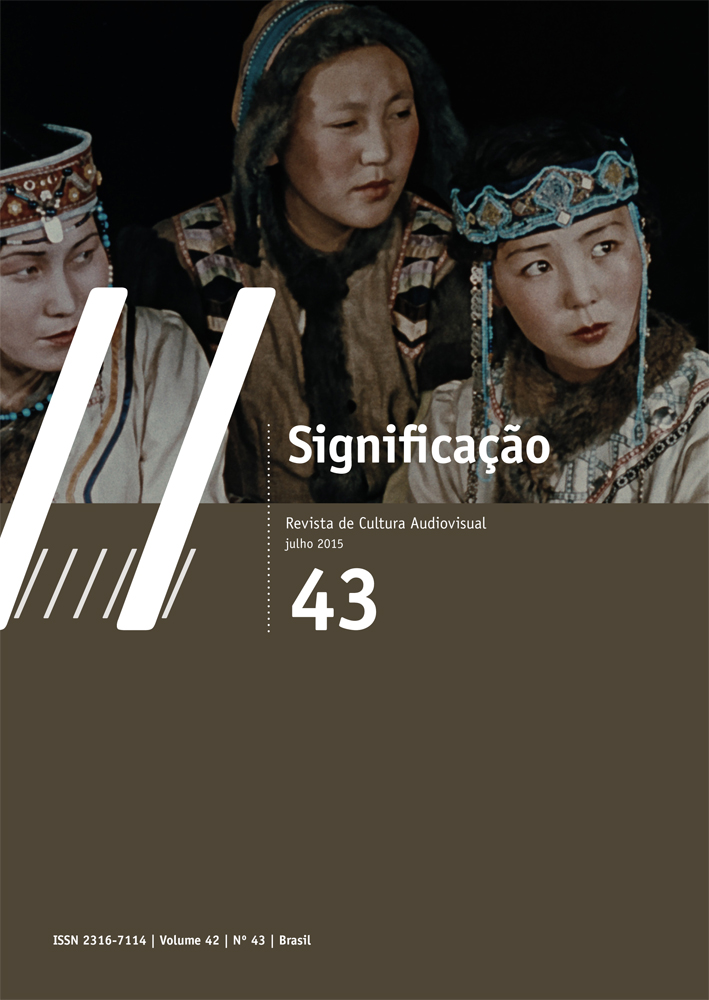The proper noun, the mirror-screen, the word-body and its Double
DOI:
https://doi.org/10.11606/issn.2316-7114.sig.2015.98301Keywords:
intermediality, social networks, construction of identity, young contemporary culture.Abstract
This article focuses on Nome próprio (Proper noun), by Murilo Salles, which dialogues with Clarah Averbuck’s novels that are centered around the young Camila; my aim is to characterize how the film reads the experience lived by this character, through the analysis of its narrative point of view and its mise-en-scène that dramatize her special investment in the act of writing, always interwoven with her personal interactions and her involvement in the dynamics of social networks, a communication field of accelerated demands and fabricated identities.Downloads
References
Averbuck, Clarah.[2002] Máquina da Pinball. São Paulo, Conrad Livros.
___________.[2004] Vida de gato. São Paulo Editora Planeta do Brasil,
___________. http://brazileirapreta.blogspot.com.br/, 09/06/2003.
Bouton, Christophe.[2013] Le temps de l’urgence. Lormont, Le Bord de L’Eau Éditions.
Foucault, Michel.[1994] “Les technologies de soi-même”, in Dits et écrits Vol. IV, Paris, Éditions Gallimard.
Foucault, Michel.[1985] História da sexualidade III, O cuidado de si. Rio de Janeiro, Edições Graal.
Genette, Gérard.[1972] Figure III, Paris, Éditions du Seuil.
Girard, René.[1961] Mensonge romantique et vérité romanesque, Paris, Bernard Grasset Éditions.
Lejeune, Philippe.[2008] O pacto autobiográfico: de Rosseau à Internet, Jovita Maria Gerheim Noronha (org.), Belo Horizonte, Editora UFMG.
Octobre, Sylvie.[2014] Deux pouces et des neurones: les cultures juvéniles de l’ère médiatique. Paris, Ministère de la Culture et de la communication – Département des études, de la prospective et des statistiques.
Pasolini, Pier Paolo.[1976] “Le cinéma de poésie”, in L’expérience hérétique: langue et cinéma. Paris, Payot, p. 135-155.
Rieffel, Rémy. [2014] Révolution numérique, révolution culturelle?. Paris, Éditions Gallimard.
Rosa, Artmut. [2014] Aliénation et accéleration: vers une théorie critique de la modernité tardive. Paris, Édition La Découverte,
Xavier, Ismail.[1997] “O olhar e a voz: a narração multifocal do cinema e a cifre da história em São Bernardo” in Literatura e Sociedade, v.2, p 127-138.
Downloads
Published
Issue
Section
License
Copyright (c) 2015 Ismail Norberto Xavier

This work is licensed under a Creative Commons Attribution-NonCommercial 4.0 International License.
Authors who publish in this journal must agree with the following terms:
- Authors keep their copyrights and grant the journal first time publication rights, having their articles simultaneously licensed under the Creative Commons Attribution License, which allows sharing texts with authorship recognition and first publication on this journal for non-commercial purposes.
- Authors are allowed to make additional contracts, for a non-exclusive distribution of the article’s version published on this journal (e.g.: publishing in institutional repositories of articles or as a book chapter), with authorship recognition and first publication on this journal.
















